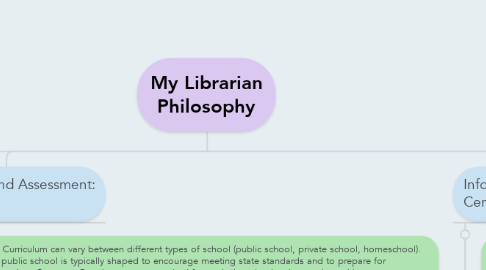My Librarian Philosophy
by Meghan Johnson

1. Educational Theory and Practice: D-
1.1. What I Know: There are 3 different styles of learning: auditory, visual, and kinesthetic. There are various educational theories that shape education. Some instructors focus on memorization of facts without deeper understanding. Other instructors focus on understanding/comprehension and encourage hands-on interaction. Environment, memory, motivation, and prior knowledge can shape the learning environment.
1.2. What I Want to Know:Theories of specific educational experts? What regulations are in place to control what is taught and how things are taught? How big a role does the government play in educational practices? What specifically are the current standards for instructors? What are new trends in educational practice? How has educational theory changed over time? How have the trends changed?
2. Curriculum and Assessment: C+
2.1. What I Know: Curriculum can vary between different types of school (public school, private school, homeschool). Curriculum in public school is typically shaped to encourage meeting state standards and to prepare for standardized testing. Common Core is a current standard for curriculum that has been adopted by many states. Principals, deans, etc. typically shape the standards instructors are expected to meet, helping to assess the effectiveness of instructors. Curriculum should not be stagnant and can vary year-to-year based on the needs of the students and state expectations for comprehension. There should be regular assessments to determine if (and what) changes should be made.
2.2. What I Want to Know: Best practices for assessing the effectiveness of a learning plan. How has curriculum changed with the adoption of Common Core? Best practices on crafting a learning plan. Technical differences between curriculum in public, private, and home schools.
3. Collaboration: A-
3.1. What I Know: Collaboration between instructors, librarians, students, etc. can lead to increased student learning. Depending on the environment, get parents, administration, and the community involved and invested in the educational process. Multiple minds working on a single project can lead to new and innovative results. Collaboration deepens and enhances the learning process.
3.2. What I Want to Know: Collaboration theorists? Benefits to different types of collaboration (instructor and instructor, instructor and librarian, etc.). How to measure the success of a collaboration vs. a non-collaboration. How to determine the type of collaboration necessary.
4. Information Literacy/21st Century Skills: B
4.1. What I Know: Definition of information literacy. Information literacy instruction. Information literacy through 21st Century tools. Librarian plays a crucial role in educating on information literacy.
4.2. What I Want to Know: How to teach information literacy across departments. What are some additional 21st Century tools? How does information literacy affect education? How to formally evaluate information literacy.


